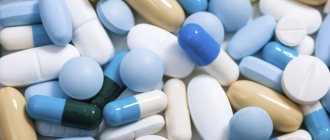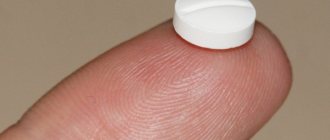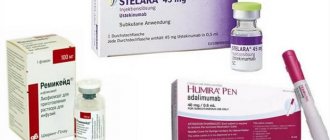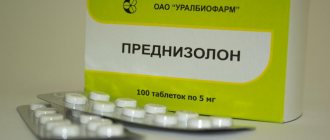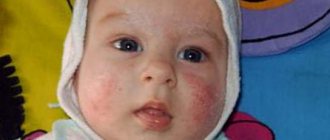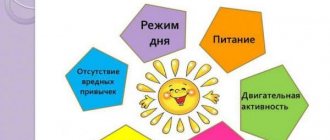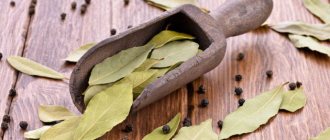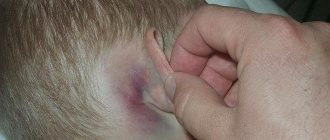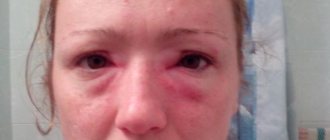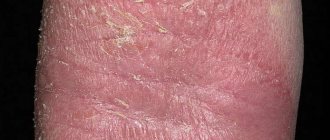When should you take antihistamines for a cough?
An allergic cough may not appear immediately.
However, this symptom is difficult to confuse with others, since it is accompanied by swelling of the nasal mucosa, runny nose and frequent sneezing. With allergies, it is always dry and unproductive. In this case, sputum is not separated and does not accumulate in the respiratory organs. With mild allergies, the cough may be weak and infrequent before taking antihistamines. But if you do not pay attention to this symptom, it can quickly develop into a strong and frequent one. In this case, the patient will not have enough air, pain and sore throat will quickly appear. Often this symptom develops into Quincke's edema. This condition is very dangerous and requires emergency medical attention. In addition to antihistamines, hormonal therapy is also indicated in this case. For children with swelling of the larynx, the hormone is sprayed through an inhaler; adults are most often given a drip with Prednisolone. It should be clarified that allergies can be either congenital or acquired. For some people it appears in childhood, for others it may occur in adulthood. It all depends on how strong a person's immune system is.
Why should you take antihistamines?
Antihistamines for allergic cough are special substances that suppress the action of the biologically active substance histamine. If an antigen enters the human body, histamine begins to actively interact with specific receptors, thereby causing a sore throat, swelling of the respiratory tract and other reactions. To stop it from working, you need to take antihistamines. At the moment, scientists have managed to develop antihistamines for three generations.
What antihistamines are recommended for cough?
Today you can find many antihistamines in pharmacies. The remedies given in the table are the best, according to allergists and network users.
Name of antihistamine
It does not cause drowsiness, works within half an hour, and is relatively inexpensive.
Children under one year of age, pregnancy and breastfeeding, bronchial asthma, diseases of the central nervous system.
High efficiency, different release forms (syrup and tablets), rapid action (fifteen minutes after administration).
Individual fructose intolerance, pregnancy and lactation, bronchial asthma.
It does not cause drowsiness and is effective in action because it is quickly absorbed into the walls of the stomach.
Pregnancy and breastfeeding, age up to one year, diseases of the central nervous system.
Convenient release form, can be given to newborns up to one year old, high efficiency.
Lactation and pregnancy, individual intolerance.
An excellent product that comes in the form of drops and gel that relieves itchy skin. Can be given to children.
The antihistamines described in the table that can be used for cough are provided for informational purposes only. They should only be prescribed by a medical specialist.
Types of Medicines for Drug Problem
Specialized doctors prescribe medications for the disease and its symptoms. Antihistamines for coughs in adults and children are the mainstay of treatment.
Many of the medications on pharmacy shelves only reduce the manifestations, but do not cure the disease.
All funds are divided into three categories:
- antihistamines;
- sorbents;
- glucocorticoids.
The first category of drugs quickly acts on the symptoms of the disease.
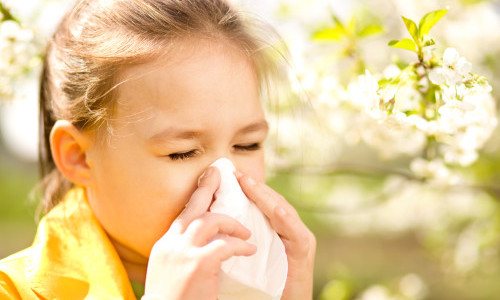
With their help, you can also get rid of a runny nose and rashes on the patient’s skin. They are prescribed based on age, body weight, and individual characteristics of the patient’s body.
Sorbents absorb harmful, toxic substances and remove them naturally. Improve metabolism, restore general immunity.
Inhaled glucocorticoids are antiallergic drugs that...
Allergic cough medications
Allergic cough tablets are prescribed for this phenomenon, since conventional antitussive drugs do not give the desired effect. In this case, a medicine is required that will not only help relieve the symptoms, but also eliminate the main cause - the effect of the irritating substance.
Despite the development of medicine, diagnosis still causes difficulties, especially when it comes to allergic cough in children. Often people suffering from cough think that this symptom is associated with ARVI, bronchial inflammation and other respiratory ailments, but traditional treatment does not produce results, and the condition worsens. How to treat cough caused by allergies?
Types of antiallergic drugs
In modern medicine, there are quite a lot of drugs that can help with allergies, they all act a little differently, although they perform the same task. Therefore, only a specialist can prescribe the best allergic cough tablets for each specific patient.
Medicines are divided into types depending on their mode of action. The following types of drugs are distinguished:
- antihistamines (block the action of histamine, which is produced by the body as a reaction to an allergen and causes unpleasant symptoms);
- mucolytics (turn a dry cough into a wet one, thinning sputum and causing mucus to leave the body faster);
- antitussive and anti-inflammatory drugs (relieve inflammation of the mucous membranes, and can also stop coughing attacks).
In addition, tablets for allergic cough in adults are divided into three generations. First-generation drugs act immediately after administration and also quickly leave the body, so their effect is very short-lived; in addition, such drugs have many side effects and can be addictive. However, they have a long history of use and are well studied. Some of them can be given to infants. And it is this type of medication that copes well with acute attacks of allergies to food, medications, insect bites and more.
Second-generation medications last longer (up to 24 hours), after taking them they do not make you sleepy, addiction cannot occur, and there are fewer side effects. But such drugs must be taken in a course once a day and you should not expect an instant effect. People with heart disease should be very careful when taking it, as second-generation drugs can cause a cardiotoxic effect.
Third generation drugs are the most effective and can even help relieve chronic allergies, as they can last longer than the season in which allergies appear. They do not cause sedation and do not reduce concentration.
Antihistamines
To get rid of various signs of allergic manifestations, including cough, medications with antihistamine action are prescribed:
The active ingredient of the drug is quifenadine hydrochloride. This remedy can be prescribed not only to eliminate symptoms, but also for preventive purposes.
It has an antipruritic effect, relieves allergic inflammation of tissues. Does not have a negative effect on the central nervous system. Side effects include drowsiness, dry mouth, and less commonly nausea.
Not prescribed for pregnant and lactating women, children under 3 years of age, as well as for those with a lack of sucrose, fructose intolerance, glucose/galactose malabsorption. There are no drugs containing the same active ingredient.
This is the most famous cure for allergic cough and other symptoms of this pathological condition. The active component of the drug is chloropyramine. This remedy is recommended for use at the first signs of an allergy.
It is available in tablet form, but for acute allergic attacks it is used in the form of ampoules for injection. It can be prescribed for any type of allergic reaction, no matter what the irritant is.
A special feature of the medicine is that it can be used to treat infants from birth. But during pregnancy, although it is prescribed, it is done with some precautions.
Analogues include drugs such as Chloropyramine and Chloropyramine hydrochloride.
Another effective and inexpensive remedy that has a sedative effect. The active substance of Diazolin is mebhydrolin, which helps eliminate rashes, itching, swelling, cough and other signs of food allergies. It somewhat reduces the reaction, so it is not recommended for use while working in hazardous industries or while driving.
Contraindications include gastrointestinal diseases, glaucoma, epileptic seizures, heart rhythm disturbances, pregnancy and breastfeeding.
Among similar products you can only find Diazolin for children (recommended from 2 years old, available in the form of granules for preparing a suspension) and Diazolin from Darnitsa.
This drug, a phenothiazine derivative, is included in the treatment of allergic reactions and asthma attacks. It is an active antihistamine that affects the activity of the central nervous system.
It has a pronounced sedative, hypnotic, antiemetic, antipsychotic and hypothermic effect. Prevents the occurrence of urticaria and itching.
Manufacturers produce Pipolfen in tablet and injection forms. Disadvantages include the likelihood of nightmares, tinnitus, and decreased blood pressure. But despite such side effects, it is prescribed to relieve allergy symptoms in children from 2 years of age.
Not recommended for long-term use, as it may adversely affect liver function.
Similar drugs include the following medications: Diprazine, Promethazine for children, Promethazine hydrochloride.
A synthetic antihistamine that has a powerful effect against allergy symptoms, the active ingredient of which is clemastine.
To treat allergic cough in adults, you can purchase the drug in a variety of forms: rectal suppositories, tablets, solutions. There is also an aerosol and ointment for external use. The product can be used for children from 6 years of age; in this case, Tavegil syrup is better suited.
The medicine begins to act 30 minutes after administration; among the negative qualities, a negative effect on kidney function can be noted. Not prescribed for pregnant women and during the lactation period.
Complete analogues of Tavegil are Rivtagil and Clemastine.
The active substance is ketotifen fumarate. Like other similar drugs for allergic cough, it has a positive effect on mast cells, preventing the release of histamines and the development of bronchial spasm. A noticeable result occurs on average 60 minutes after taking the product.
Contraindicated during pregnancy and lactation; also, according to the instructions, not suitable for use in children under 3 years of age. But, given the small number of side effects, it can be prescribed to eliminate signs of allergies at an earlier age, but this is only on the recommendation of a doctor. For children, you can buy Ketotifen syrup.
If we talk about structural analogues, then these include medications such as Staffen. Zaditen, Ketof, Frenasma, Pozitan.
Another medication that can cure coughs of allergic origin. This is a selective drug that is popular because it does not affect the functions of the central nervous system. And at the same time, it effectively eliminates allergy symptoms without a sedative or depressing effect.
It is also used to treat allergies in children, in the form of tablets from the age of 6, syrup is prescribed by a doctor from the age of 2. A noticeable effect from taking Cetrin occurs within 20 minutes and lasts for 24 hours.
This allergy medicine belongs to the first, non-selective generation and has a moderate sedative effect. Eliminates the traditional set of allergic manifestations: skin itching, allergic runny nose and cough.
You can purchase the drug in the form of drops and tablets for internal use and gel for external use. Can be used for infants, according to the instructions, from 1 month, and according to indications with the approval of a doctor, even earlier.
The disadvantages of Fenistil include the fact that it eliminates only the symptoms without affecting the cause of the allergy - the irritant.
This product has only one structural analogue - Vectavir.
A drug whose active ingredient is desloratadine, which relieves signs of allergies, but does not affect brain function, that is, it does not dull attention or slow down the reaction.
In childhood, Erius syrup is prescribed, and in adult patients in the form of tablets. The first effect is observed 30 minutes after administration, the effectiveness remains throughout the day.
A course of the drug can be prescribed only if the allergy manifests itself in acute form. Side effects include attacks of dizziness, impaired bowel movements, lethargy, and increased fatigue.
Analogue drugs include drugs such as Dezal, Ezlor, Lordestin, Desloratadine, Elisea, Nalorius.
This antihistamine belongs to the second generation of drugs. It is used for preventive purposes, eliminates acute symptoms, thereby easing the course of the disease. Improves coughing, reduces swelling and hyperemia.
It is recommended for children from 12 months of age in the form of drops, and from 6 years old they can already be given tablets, but of course under the supervision of a specialist. The maximum effectiveness of the medicine appears in the evening, so it is best to take it before bed.
Structural analogues containing, like Zyrtec, cetirizine hydrochoride as an active component, are the following drugs: Zodak, Alerza, Cetirizine Hydrochloride, Tsarlazin, Zintset, etc.
But in addition to medications, you can successfully use folk remedies for allergic cough.
Improved drugs
Second generation antihistamines for allergic cough have several significant advantages:
- do not have a sedative effect on the body, since the active substances of these drugs do not cross the blood-brain barrier;
- their intake does not contribute to damage to mental activity and physical activity;
- lasts for 24 hours, which reduces the intake of tablets to one per day;
- do not contribute to the body’s addiction, so they can be treated for several months in a row;
- are not adsorbed with food entering the gastrointestinal tract.
But, despite the fact that they relieve the symptoms of allergic cough, their work negatively affects the functioning of the heart, so they are highly not recommended for use in the presence of cardiac diseases. This is because antihistamine tablets for allergic coughs interfere with the functioning of the heart's ion channels. The list of drugs with this effect includes:
- Claridol. They help cope with seasonal allergies. It reduces the degree of capillary permeability, relieves swelling of the respiratory tract, and can cause an anticholinergic and sedative effect.
- Clarotadine. It acts in a similar way to other antihistamines, but does not cause distracted attention and is not addictive. You should not take it if you have increased anxiety, frequent drowsiness, or depression, as it only worsens them.
- Zyrtec. This remedy eliminates allergy symptoms and even prevents their development. Zyrtec inhibits the release of mediators, reduces the movement of leukocytes, relieves sore throat, and reduces capillary permeability.
Cough medications for allergies also include Lomilan, LauraGexal, Claritin, Kestin.
Alternative medicine against allergic manifestations
Among the common safe methods for allergies, you can find many ways to relieve unpleasant symptoms. For example, if a patient is bothered by regular night coughing attacks, to prevent them, it is recommended to take warm baths with decoctions of medicinal herbs that have a calming effect before going to bed.
With the help of medicinal plants, you can cleanse the main organs and blood of toxic allergenic substances. Teas and watermelon are successfully used for the same purposes. Naturally, if the patient is not allergic to these products.
The following recipes for home use can help eliminate attacks of allergic cough:
Celery juice - 1.5 tablespoons before eating a freshly squeezed drink, will alleviate the condition;
Vegetable juice - a drink consisting of carrot, apple, cabbage juice and parsley, taken daily before meals will help cope with an annoying dry cough;
Nettle infusion can eliminate cough in a short time if taken 4 times a day;
Calcium chloride diluted in cold water can eliminate symptoms caused by food allergies;
Infusion of horsetail - it is used for instillation into the nasal passages. The product eliminates allergy symptoms, including attacks caused by plant pollen entering the respiratory tract;
It is useful for allergies to take baths with essential oils - patchouli, rose, lemon, etc. They are also used for inhalations and for compresses on the chest area.
Any sign of a pathological condition, such as an allergic cough, can be no less exhausting than a cold symptom. Therefore, it is important to seek medical help in a timely manner, and only a specialist can tell you which tablets or syrup should be taken and whether it is possible to use only folk remedies.
How to treat allergic cough in adults?
Before starting treatment, it is important to identify allergens . It can be not only pollen, dust and pet hair, but also cosmetics, perfumes, and cleaning products.
If possible, contact with allergens should be avoided. Cough itself is a protective reaction of the respiratory system, designed to protect the human body from allergens.
If you cannot determine the cause of your cough, you should seek help from an allergist.
Here are some precautions to help people prone to allergic reactions:
- Eat only home-cooked food or dishes whose ingredients you know for sure.
- Drink clean water.
- Avoid excess citrus fruits in your diet.
- Buy a humidifier.
- Avoid scented cosmetics, air fresheners, and deodorant sprays.
- Buy hypoallergenic pillows and mattresses.
Dry cough
Most often, this symptom manifests itself when dust, cigarette smoke, particles of skin and animal hair enter the respiratory tract.
A cough that does not produce mucus or sputum is called a dry cough.
This condition can also be a side effect of taking certain medications . Often, a dry cough due to allergies occurs when taking medications to lower blood pressure, such as ACE inhibitors and beta blockers.
If the cough does not go away for a long time, you need to visit a doctor and find another remedy.
For a dry cough, antihistamines are sometimes prescribed. Gargling with salted water and warm herbal teas will help speed up the healing process. Plantain-based syrups are also useful .
Wet cough
With a wet cough, the lungs and bronchi are cleared of mucus. This symptom often appears in people working in hazardous industries.
This type of cough is very dangerous to contain, as harmful microorganisms accumulate in the sputum .
If the mucus is difficult to clear, the patient is prescribed expectorants. Cough syrups are also useful.
Cough from dust
If you are allergic to dust, it is important to adhere to the following rules:
- Get rid of things that can quickly accumulate dust - carpets, long-pile fur coats, soft toys, etc.
- Bath your pets regularly
- Do not forget that you should carry out wet cleaning as often as possible.
- Do not use wool blankets.
A good solution would be to purchase a vacuum cleaner with an aqua filter. If such an illness manifests itself mainly at night, then it is necessary to purchase hypoallergenic bedding, and also ensure that the air in the room is not dry.
An allergic cough is a reaction to the entry into the body not of dust itself, but of substances secreted by dust mites. The body perceives them as a direct threat to health, which results in such unpleasant symptoms.
Dust mites live in apartments all year round, so manifestations of this disease can haunt a person for years.
It is important for those who come into contact with household dust due to their professional activities, for example librarians and archive workers, to undergo regular medical examinations .
Causes of allergic cough
Allergic cough is not a disease, but only a specific manifestation of the body to an allergen
When foreign microorganisms and allergens enter the respiratory tract, a person develops swelling and inflammation of the mucous membrane of the larynx, nasal passages, and trachea. As a result, this leads to spasm of the respiratory tract, which is what causes coughing. This is a kind of response of the body.
Cough can occur due to various allergic reactions, even in a healthy person. Typically, an allergic cough appears in children with weakened immune systems. The risk group includes children suffering from diathesis and on hormonal treatment. In adults, this cough does not develop as often. It is most often observed in people working in hazardous conditions, where the air is heavily polluted, fumes of toxic substances, paints and varnishes, etc. are observed.
The main provoking substances predisposing to the development of allergic cough:
You should be aware that taking certain medications can also trigger an allergic cough.
There are cases when an allergic cough occurs due to eating allergenic foods, such as strawberries, wild strawberries, nuts, fruits, honey, fish, eggs.
In addition, cough can be a symptom of a disease of an allergic nature: allergic tracheitis, rhinitis, obstructive bronchitis.
Signs of the disease
A dry cough, tickling throat, runny nose and red eyes are signs of an allergic cough.
An allergic cough must be distinguished from the symptoms of other diseases. At the beginning of the development of the disease, it is very difficult to distinguish it from an acute respiratory viral infection or a cold.
If the cough is of an allergic nature, then it has the following characteristic features and may be accompanied by the following symptoms:
Usually the cough when an allergen enters the body is dry. The patient cannot cough up due to irritation of the mucous membrane. During severe coughing attacks, a person may experience shortness of breath. In most cases, attacks appear suddenly, immediately after contact with the allergen.
A distinctive feature of an allergic cough is the absence of fever, headache, and chills.
Allergic cough and other accompanying symptoms cannot be eliminated with conventional medications, but after taking antihistamines, the symptoms quickly disappear.
Causes
The chain of transformations leading to allergies is triggered by histamine from mast cells in the mucous membranes of the respiratory tract. The release of histamine requires irritants:
- allergens;
- stress factors - hypothermia, overheating, trauma, radiation.
Allergic predisposition is inherited. The allergy mechanism is triggered under the influence of environmental pollution and occupational hazards.
- Congenital allergies cannot be completely cured; they sometimes worsen during life.
- Acquired allergies are often associated with working in hazardous industries.
Causes a dry, characteristic cough:
- smoking;
- dust;
- mold;
- products with histamine - cheese, ethanol, cocoa, coffee, soy, kiwi, bananas, pineapple, pear.
Drugs for the treatment of allergic cough
Effective medications for allergic cough can only be prescribed by a doctor, depending on the age and severity of the disease.
Allergic reactions are treated with medications. Many medications can reduce the symptoms of allergic cough, but are not able to cure allergies.
For allergic coughs in adults and children, 2 types of drugs are used - cough suppressants and sputum thinners. The first group is used in exceptional cases, and the second for respiratory tract infections in which viscous sputum is formed. Such drugs are prescribed only by a doctor and are not used for a long time.
To eliminate allergic cough, antihistamines are often prescribed:
- Claritin. Antiallergic drug with the active ingredient loratadine. Can be purchased in tablet or syrup form. The drug is not prescribed to children under 2 years of age.
- Tavegil. A drug that has an antiallergic effect. Available in any form. Take the drug for 7 days. After use, the effect occurs within 30 minutes. The product should not be taken by children under 6 years of age.
- Suprastin. The use of the drug is effective for any allergic reactions. Up to 6 years old, take 1/3 of the tablet, and from 7 years old, you can take 1/2 of the tablet.
- Zyrtec. Second generation anti-allergy remedy. It can be used not only to relieve allergy symptoms, but also to prevent allergic diseases.
- Peritol. The drug has antiallergic, antiserotonin and sedative effects. Children over 2 years of age should take it in syrup form.
- Other antihistamines have also proven themselves to be effective: Cetrin, Ketotifen, Fenistil, Erius, Telfast, etc.
If you have symptoms of an allergic cough, you should consult your doctor about the possibility of using antihistamines. You should not treat yourself, as many medications have contraindications.
Traditional methods of treatment
It should be remembered that folk recipes do not help get rid of the disease, but only soften the symptoms.
To mitigate the symptoms of an allergic cough, you can use alternative medicine recipes. Tinctures and decoctions have a positive effect on the immune system and reduce susceptibility to allergens.
Effective folk remedies for treating allergic cough:
- Milk with onions. Take one small onion and place it in a glass of hot milk. Next, boil for a few minutes. Wait until it cools down and drink in 2 doses.
- Honey syrup. Chop 5 small onions and add a liter of water. Add 5 tablespoons of honey to the container and put on fire.
- Lemon-honey mixture. Finely chop the lemon, add 4 tablespoons of water and 2 tablespoons of honey. Stir the mixture well, put on fire and cook until a homogeneous mass is obtained. Take a tablespoon warm about 5 times a day.
- Chamomile decoction with lemon. Take a tablespoon of dried chamomile flowers and finely chopped lemon and pour into a thermos. Add a little black tea there and pour boiling water over it. Leave to infuse for an hour. Use in small quantities throughout the day.
- Garlic syrup. Finely chop a few cloves of garlic, mix with liquid honey and leave for a day. Take a tablespoon of the prepared syrup every day when a coughing attack occurs.
- Inhalations are effective in combating allergic cough. Boil the potatoes, add 2-3 leaves of thyme and eucalyptus to the water. Boil for 4-5 minutes. Next, add a drop of fir oil and stir. Take a terry towel, lean over the pan and inhale the vapors for 15 minutes. You can perform alkaline inhalations with the addition of soda.
- It is useful for children to rub their back and chest with goat fat mixed with butter. After completing the procedure, dress the child warmly.
Effective drugs of the latest generation
3rd generation drugs are classified as prodrugs; once they enter the body, they are converted into metabolites, intermediate metabolic products in living cells. Their distinctive feature is that they do not have a cardiotoxic or sedative effect. They can also be taken over a long period. These include:
- Gismanal. It can provoke an increase in appetite, dry mucous membranes, and also increase the risk of attacks of the cardiovascular system.
- Trexyl. It is least dangerous when used by patients with glaucoma and those who have prostate diseases.
- Telfast. It is highly effective and is a metabolite of terfenadine. Thanks to it, the membranes of mastocytes and labrocytes come into a stable state, and the amount of histamine released from them decreases. It does not affect the concentration and speed of reaction of the patient.
The least dangerous antihistamines are Claritin, Zyrtec, Allegra. Remember that before use you should consult a specialist.
For an allergic cough, you can also take Loratadine, Cetrin, Fenkarol, Suprastin, Diazolin. They are approved for use in small doses even by children; some of them have special release forms for children.
Complications
Improper treatment of allergic cough can cause dangerous complications
If you do not take measures to eliminate an allergic cough, this increases the risk of complications.
Possible consequences of an allergic cough:
With allergic bronchitis, wheezing is observed when inhaling. They may be wet, dry or whistling. Subsequently, the cough becomes productive with sputum production. Sometimes shortness of breath may occur. The development of obstructive bronchitis is caused by prolonged exposure to the allergen on the respiratory tract. In this case, the main symptom of obstruction is shortness of breath.
An allergic cough can lead to serious complications, so it is necessary to take timely measures to eliminate it.
With bronchospasm, the space between the bronchi and bronchioles decreases in size. The patient's breathing rhythm is disrupted, shortness of breath and severe cough appear. The skin becomes pale and the area under the eyes turns blue.
Useful video - Allergies: symptoms and treatment:
Bronchial asthma is a chronic disease of the respiratory tract. Allergens, acting on the mucous membrane, enhance the reaction of the bronchi, as a result, mucus is released and bronchospasm appears. Asthma is manifested by the following symptoms: shortness of breath, wheezing and whistling from the throat, signs of suffocation.
What is considered an allergy, how is her cough different?
A cough with allergies differs from a cough with bronchitis in many ways:
dry, without producing a large amount of sputum;
Main signs of the disease:
- suffocation;
- sneezing;
- runny nose;
- lacrimation;
- redness of the eyes;
- difficulty breathing;
- rashes on the skin.
Such an illness can cause discomfort not only for an adult, but also for a child for a long time.
If its attacks and symptoms appear for more than one month, then you should seek qualified help from doctors, as well as begin quality treatment. Eye irritation is the first sign of the disease.
The cough usually begins in the last month of spring, as well as at the beginning of summer, when vigorous flowering of plants begins, as well as solar activity.
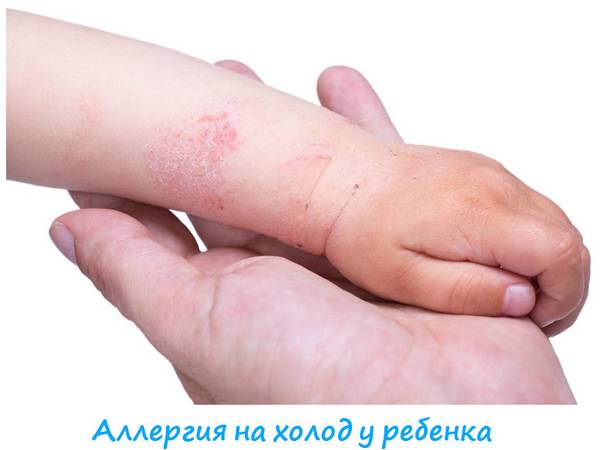
If the source of the allergy is located in the room where the sick person lives, it should be eliminated immediately. The body's reaction and attacks of suffocation disappear on their own.
Causes of the problem:
- food allergies;
- extreme cold or heat;
- household mold, mildew;
- reaction to household chemicals;
- allergies to animal hair and bird down, to insect bites.
For any of the symptoms, a person must undergo a full course of examination in an inpatient or outpatient setting.
Doctors, in order to find out the causes of the disease, use various diagnostic techniques.
Cough is very dangerous for patients with bronchial asthma or chronic bronchitis.
Typically, attacks occur suddenly in the late evening or at night, when the human body is at rest.
Expectorants for allergic wet coughs for children and adults have absolutely no effect.
Diagnostic methods include:
- nasal swab;
- skin tests;
- sputum analysis;
- bronchophonography;
- general blood analysis;
- linked immunosorbent assay;
- multiple chemiluminescence method.
A comprehensive diagnosis of the body allows one to accurately distinguish this disease from the cold variant.
It becomes possible to determine what treatment is needed.
Prevention
The most effective treatment for allergic cough is eliminating the allergen
To prevent the occurrence of an allergic cough, the following recommendations must be followed:
- Limit contact with the allergen.
- Eliminate foods containing dyes from your diet.
- Take measures to strengthen the immune system (harden the body, eat vegetables and fruits, etc.).
- It is advisable to carry out wet cleaning every day.
- Do not use fragrances, cosmetics, detergents with added fragrance, etc.
- Soft toys, carpets, woolen blankets can provoke the development of a coughing attack, so these things must be removed.
- It is better not to have pets.
- It is recommended to rinse with an isotonic solution after going outside. This will remove accumulated dust, allergens and foreign microorganisms from the nose and mouth.
- If possible, you should stop smoking.
- In spring and summer, if the cause of the cough is hay fever, then you need to go outside less often.
- Children's toys absorb a lot of dust. Small children put everything in their mouth, so toys should always be washed under running water.
These are the basic recommendations that must be followed to prevent the development of an allergic cough.
Readers liked:
Share with your friends! Be healthy!
11/25/2017 at 11:07 pm | #
As an experienced allergy sufferer, I want to say that you cannot do without a proven allergy medicine. My symptoms start in mid-summer and include coughing. At first I used oral medications, now, for five years now, I have been using injectable ones, they are more effective and the positive effect lasts longer.
Our pages
Discussions
- Nina - I kept thinking that. – 04.12.2017
- Natalya – It’s a very complex disease that’s difficult. – 04.12.2017
- Daniel - There may be several options, this. – 03.12.2017
- Ksenia - I also brought the baby into. – 03.12.2017
- Nina - And I use it. Wonderful. – 03.12.2017
- Daniel - When such sensations arise. – 03.12.2017
The medical information published on this page is strictly not recommended for self-medication. If you feel negative changes in your health, immediately contact an ENT specialist. All articles published on our resource are for informational purposes only. If you use this material or a fragment of it on your website, an active link to the source is required.
Post Views: 3,358
Preventing allergic cough in a child at home
Preventing allergic cough in a child at home
The basis of the prevention of allergic cough is to prevent the child from coming into contact with all possible allergens. For this purpose it is necessary:
- Regularly ventilate the room in which the child is located;
- During the flowering period of plants whose pollen causes allergies, it is necessary to take antihistamines. However, this should only be done after consulting a doctor.
Carry out wet cleaning of the apartment at least 2 times a week;
It is recommended to limit the child’s contact with pets, if any;
Treatment
Although the main part of treatment is eliminating the cause of the problem, that is, contact with the allergen, in cases where this is impossible to do, or the symptoms of cough are very noticeable, symptomatic drug treatment cannot be avoided.
Antihistamines
The principle of action of such drugs is based on the formation of persistent chemical bonds with histamine by the substances in their composition . This substance is one of the main ones produced by the body during allergies and it is responsible for inflammatory processes on the skin and mucous membranes.
Antihistamines are usually divided into generations according to the characteristics of their composition and the effect on the patient:
- Representatives of the first generation, diphenhydramine, tavegil, suprastin, quifenadine, diazolin, etc. have a worse affinity for histamine, and therefore for a noticeable result they must be taken in high concentrations and several times a day. In addition, the composition of these drugs is such that they affect some other receptors and the human nervous system, causing lethargy, drowsiness, and lethargy. People with heart disease may experience tachycardia and arrhythmia.
- The next generation of antihistamines is represented by drugs such as loratadine, astemizole, dimethindene and others. Due to their greater affinity for histamine and the lack of impact on receptors and the central nervous system, their effectiveness is higher, there are significantly fewer side effects and a single dose per day is usually sufficient. However, the possibility of side effects cannot be completely ruled out. The reason for this is the peculiarities of the composition of such funds. Usually, the medicine itself does not contain substances that have a therapeutic effect, but they become so under the influence of physiological processes in the body after administration. And if at some stage this process is disrupted, then the product will accumulate inside and can cause various unpleasant reactions of the body.
- Medicines of the latest third generation today already contain an active ingredient, so there is no risk that something will go wrong and there will be side effects from taking them. The most well-known representatives of this generation of antihistamines are cetirizine (Zyrtec) and fexofenadine (Telfast).
Homeopathic
There is a common belief that homeopathic medicines can help with this problem, but in reality this is not entirely true. Homeopathic remedies are a very dubious method of treatment, whose effectiveness has not been proven by any scientific research. The fact is that the very principle of homeopathy implies the presence of such microscopic doses of the active substance in the drug that even if it were really useful, it would still not be able to affect anything in such a concentration. Therefore, the effectiveness of this treatment method is usually no higher than that of a placebo. So treatment with homeopathic medicines is strongly not recommended.
But homeopathy should not be confused with folk remedies - and some people believe that they are synonymous. Properly selected and wisely used decoctions of herbs and fruits and other predominantly plant mixtures and compositions can significantly alleviate the condition of an allergy sufferer. But their thoughtless and uncontrolled use will only make things worse, since many plants are quite strong allergens in themselves.
Mucolytics
Drugs of this type are also called expectorants due to their main direction of action. Accordingly, they are applicable to facilitate the discharge of sputum and dilute it during a strong dry cough.
Examples of these drugs can be, for example, Mucaltin, Thermopsis and some others.

